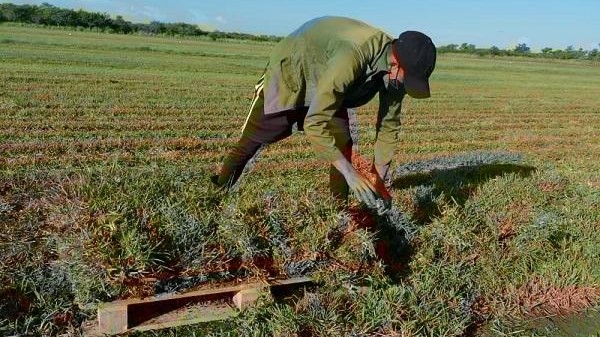Delays of months, expenses of resources of the personal patrimony, demotivation, breach of commitments, bureaucracy, that is what the Cuban peasants who have tried their luck with the Banco de Fomento Agrícolathat the official newspaper itself Granma has described as “the bank of patience” in an article published this Sunday.
The mechanism began to operate nationally in September 2021 and, like any state project, has been advertised as another solution to alleviate the shortage in the last link in the production chain: the dining table.
According to state media, Around 1,800 million pesos were allocated from the State Budget for the Banco de Fomento Agrícolawhose objective is to raise productive yields, by providing farmers with liquidity to pay for the expenses that this work implies, but the reality is different.
In Guantánamo, for example, apart from the fact that “there are very few requests to date, in relation to the number of producers in the province”, the complaints of those who have ventured into the process are various.
José Miguel Hernández Lías, from the Credit and Services Cooperative (CCS) Lino Álvarez, in the municipality of Guantánamo, and with almost 30 years of work on the La Niña farm, in the Obrero neighborhood, had never asked for credit before. He requested 250,000 pesos for two hectares of bananas.
“When they went to the cooperative to explain the advantages of credit, they showed my file as an example, with all the documents ready to receive a response in seven days,” Hernández Lías told Granma.
All of that happened in March, but it wasn’t until the end of May that he received the first part of the money. Seven days had turned into about two months.
Incomplete documents, number errors, inconsistencies with the producer’s demand (the amount to pay for one hectare was approved and it should have been for two), among other issues, lengthened the loan granting process.
In that period lost part of the investment it made in seeds, amounting to about 40,000 pesos, because I didn’t have the land ready. Today, of the 8,000 plants that he should have had, he only has 2,000, according to the farmer’s account.
Cash is another big problem. “It is said that payment is by invoice and, currently, state suppliers have nothing, and individuals only sell if you give them the money directly; but the Bank cannot deliver the money to us in hand; to top it off, the amount For the payment of wages to my workers, I have not been able to get it because it must be by card, and Bandec has not given it to me,” he explained.
In the case of José Pelegrín García, from the same CCS, from 78,000 pesos allocated for a hectare of burro plantain, he only obtained “25,000, after much insistence”.
In your opinion, the financial staff of the cooperative is not fully prepared to assume what the request for these credits means and the Bank should advise more and better the productive forms to avoid errorsand again.
“Obviously there is a lack of training and agility to make this tool, which is the Agricultural Development Bank, something effective,” commented Pelegrín García, because in the end the one who loses is the farmer who falls behind, spends resources from his personal assets, gets discouraged , and could fail to fulfill its commitments by sitting and waiting on the bench of patience.
The documentation to apply for agricultural development credits includes: the productive results endorsed and certified by the delegation of Agriculture, the company or the cooperative, the application form (acquired at the bank), the insurance policy and the contract of sale, to know what the money will be spent on. credit.
Not everyone who produces has access. Beneficiaries must meet the requirements for each activity, among them the yields by area, the application of science and technology, having irrigation systems, and having the industry, the national balance and the agricultural markets as destination for their harvests. The availability of food and water is essential in the case of livestock.
One month after the credit granting process began, in October 2021 Holguin producers interviewed by DIARIO DE CUBA complained about the bureaucracy that accompanies the fund: “It’s as if they didn’t care about the production cycle or didn’t know how much a delay could affect agricultural yield,” they said.
–


